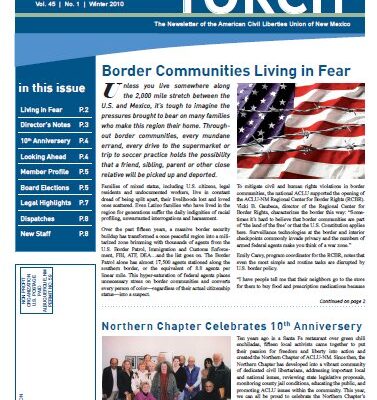New Mexicans Want Protection from Terrorism But Not at the Expense of Civil Liberties
FOR IMMEDIATE RELEASE
DATE: Tuesday, October 10, 2006, 9 AM MST
CONTACT: Whitney Potter, Communications Manager, ACLU-NM
PHONE: (505) 266-5915 ext. 1003 or (505) 507-9898 Cell
ALBUQUERQUE, NM —New Mexico voters want to see Congress take a stronger role in providing checks and balances to the President’s actions in fi ghting terrorism. They also voice a strong preference for House and Senate candidates who will oppose the President’s policies on the treatment of Guantanamo detainees, the use of torture and extraordinary rendition of detainees as well as secret searches of the private records of Americans, according to a recent survey of 600 New Mexico registered voters.
“This poll shows that the voters of New Mexico care deeply about protecting our civil liberties, which have been under unprecedented attack by the Bush Administration,” said New Mexico ACLU Executive Director Peter Simonson. “We think it is important that this solid support for civil liberties be a key part of the debate leading up to November’s elections. Candidates should know that while the voters of New Mexico want protection from terrorism they don’t want it at the expense of their Constitutional rights,” he said. “Those who try to use terrorism as a political wedge issue are in for a rude awakening.”
In this time of an unpopular war and a troubled economy, the survey reports that New Mexico voters view the country as on the wrong track (58 percent) versus going in the right direction (35 percent), and they also voice strong support for the protection of their civil liberties.
Two-thirds (66 percent) of New Mexicans reject President Bush’s claim that he should be able to take whatever actions are necessary to protect America from terrorists without the checks and balances of Congress and the judiciary.
Looking to the November elections, New Mexico voters strongly express a preference for candidates who oppose policies the President has sought in the name of fighting terrorism. For example:
- Extraordinary rendition: 73 percent would vote for a candidate who opposes “allowing government agents to capture people in foreign countries and secretly fl y them to other countries, and then torture them to gather information about terrorism,” over a candidate who supports it(19 percent);
- Torture: 70 percent would vote for a candidate who opposes “the government torturing prisoners to gather information about terrorism,” over a candidate who supports it (23 percent);
- Military Tribunals: 60 percent would vote for a candidate who opposes “putting detainees at Guantanamo military base on trial in military tribunals at which the suspects are NOT allowed to see all of the evidence against them and the government could use hearsay evidence obtained during the interrogation of other terrorist suspects” over a candidate who supports this (29 percent); and
- Holding detainees without charges: 58 percent would vote for a candidate who opposes “the government holding detainees at Guantanamo military base as it has for the past fi ve years without charging them with a crime or without access to a lawyer,” over a candidate who supports this (33percent).
And, more than half of New Mexico voters (56 percent) would be more likely – and 42 percent would be “much more likely” – to support the Congressional candidate who “says the President is wrong when he violates our laws and civil liberties in the name of fi ghting terrorism and we can protect America and at the same time uphold the Constitution” than the candidate who “strongly supports the actions the President has taken in the name of fi ghting terrorism and says we should be willing to give up some civil liberties to keep Americans safe.” Three in ten (31 percent) would be more likely to choose the candidate who supports the President.
The ACLU is a non-partisan organization that does not support or oppose candidates for elective offi ce. The organization works with both Republicans and Democrats in advocating protections for civil liberties.
The random sample telephone interview survey was conducted for the ACLU by the Washington, D.C.-based polling fi rm of Belden Russonello & Stewart Sept. 13-24, 2006, and has a sampling error of plus or minus 4 percent.
# # #

